九年级英语下册Unit 1 Asia Period 1教案 新版牛津版
- 格式:doc
- 大小:92.50 KB
- 文档页数:2
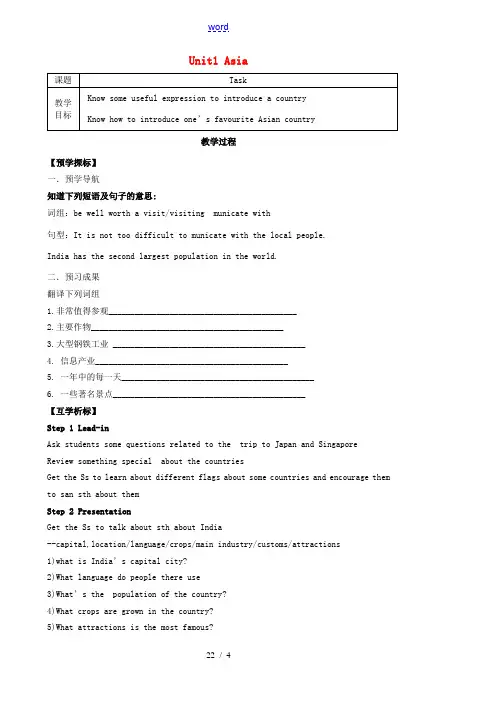
Unit1 Asia教学过程【预学探标】一.预学导航知道下列短语及句子的意思:词组:be well worth a visit/visiting municate with句型:It is not too difficult to municate with the local people.India has the second largest population in the world.二.预习成果翻译下列词组1.非常值得参观___________________________________________2.主要作物____________________________________________3.大型钢铁工业 ____________________________________________4. 信息产业____________________________________________5. 一年中的每一天____________________________________________6. 一些著名景点____________________________________________【互学析标】Step 1 Lead-inAsk students some questions related to the trip to Japan and Singapore Review something special about the countriesGet the Ss to learn about different flags about some countries and encourage them to san sth about themStep 2 PresentationGet the Ss to talk about sth about India--capital,location/language/crops/main industry/customs/attractions1)what is India’s capital city?2)What language do people there use3)What’s the population of the country?4)What crops are grown in the country?5)What attractions is the most famous?Step 3 Writing and analyzeAcplish partB, dealing with some language points.Analyze the structure of the passageIndiaStep 4 WritingGet the Ss to write an article to introduce a country with the help of the useful words and expressions:…is a great country/wonderful place to visitIt lies inIt is next toIts capital city is …People in ….speak …There are over …people thereIt ’s famous for ……is well known and worth a visitStep 5correcting &modifyingGet the Ss to correct it in groupModify the article and finish it【促学化标】Step III 写作Write an introduction to an Asian country for the exchange students .【回学验标】What have you learned in this class?【评学测标】一.翻译句子1.印度有世界上第二大人口数。
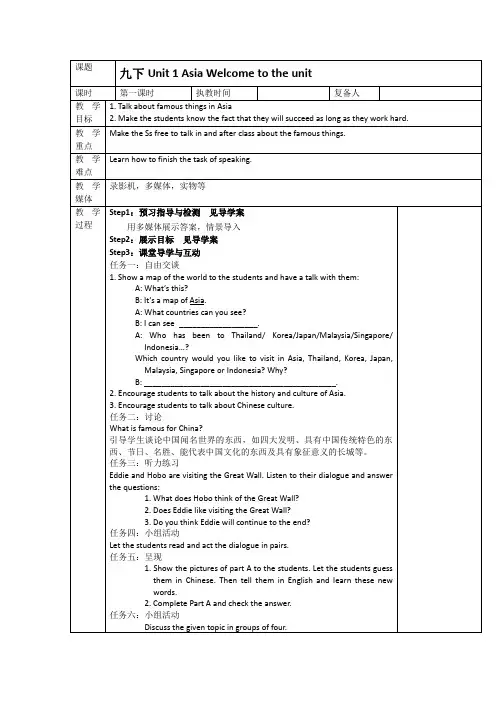
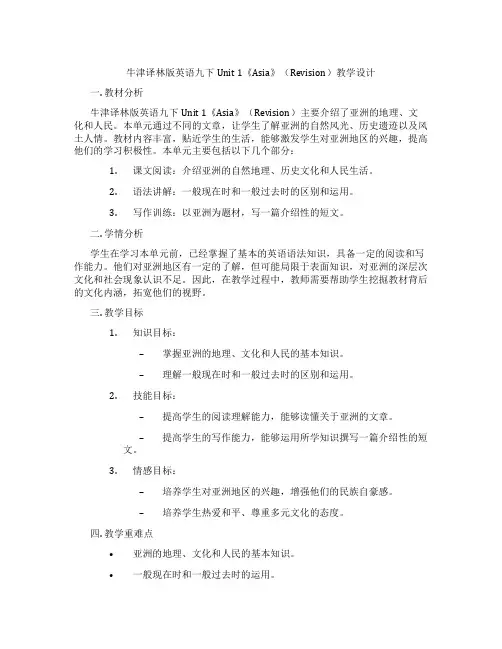
牛津译林版英语九下Unit 1《Asia》(Revision)教学设计一. 教材分析牛津译林版英语九下Unit 1《Asia》(Revision)主要介绍了亚洲的地理、文化和人民。
本单元通过不同的文章,让学生了解亚洲的自然风光、历史遗迹以及风土人情。
教材内容丰富,贴近学生的生活,能够激发学生对亚洲地区的兴趣,提高他们的学习积极性。
本单元主要包括以下几个部分:1.课文阅读:介绍亚洲的自然地理、历史文化和人民生活。
2.语法讲解:一般现在时和一般过去时的区别和运用。
3.写作训练:以亚洲为题材,写一篇介绍性的短文。
二. 学情分析学生在学习本单元前,已经掌握了基本的英语语法知识,具备一定的阅读和写作能力。
他们对亚洲地区有一定的了解,但可能局限于表面知识,对亚洲的深层次文化和社会现象认识不足。
因此,在教学过程中,教师需要帮助学生挖掘教材背后的文化内涵,拓宽他们的视野。
三. 教学目标1.知识目标:–掌握亚洲的地理、文化和人民的基本知识。
–理解一般现在时和一般过去时的区别和运用。
2.技能目标:–提高学生的阅读理解能力,能够读懂关于亚洲的文章。
–提高学生的写作能力,能够运用所学知识撰写一篇介绍性的短文。
3.情感目标:–培养学生对亚洲地区的兴趣,增强他们的民族自豪感。
–培养学生热爱和平、尊重多元文化的态度。
四. 教学重难点•亚洲的地理、文化和人民的基本知识。
•一般现在时和一般过去时的运用。
•理解亚洲文化背后的深层次含义。
•运用所学知识撰写一篇介绍性的短文。
五. 教学方法1.任务型教学法:通过完成各种任务,让学生在实践中掌握知识。
2.情境教学法:创设真实的情境,让学生在特定的环境中感受和理解知识。
3.合作学习法:鼓励学生相互合作,共同探讨问题,培养团队精神。
六. 教学准备1.教材:牛津译林版英语九下Unit 1《Asia》(Revision)。
2.多媒体设备:电脑、投影仪、音响等。
3.教学素材:相关图片、视频、音频等。
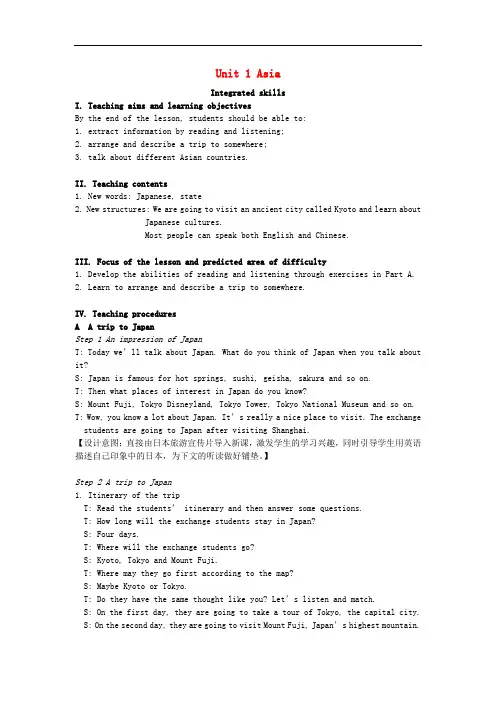
Unit 1 AsiaIntegrated skillsI. Teaching aims and learning objectivesBy the end of the lesson, students should be able to:1. extract information by reading and listening;2. arrange and describe a trip to somewhere;3. talk about different Asian countries.II. Teaching contents1. New words: Japanese, state2. New structures: We are going to visit an ancient city called Kyoto and learn aboutJapanese cultures.Most people can speak both English and Chinese.III. Focus of the lesson and predicted area of difficulty1. Develop the abilities of reading and listening through exercises in Part A.2. Learn to arrange and describe a trip to somewhere.IV. Teaching proceduresA A trip to JapanStep 1 An impression of JapanT: Today we’ll talk about Japan. What do you think of Japan when you talk about it?S: Japan is famous for hot springs, sushi, geisha, sakura and so on.T: Then what places of interest in Japan do you know?S: Mount Fuji, Tokyo Disneyland, Tokyo Tower, Tokyo National Museum and so on. T: Wow, you know a lot about Japan. It’s really a nice place to visit. The exchange students are going to Japan after visiting Shanghai.【设计意图:直接由日本旅游宣传片导入新课,激发学生的学习兴趣,同时引导学生用英语描述自己印象中的日本,为下文的听读做好铺垫。
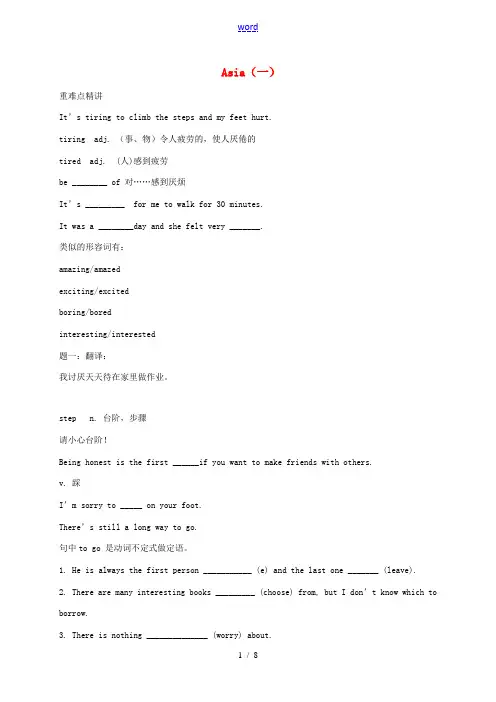
Asia(一)重难点精讲It’s tiring to climb the steps and my feet hurt.tiring adj. (事、物)令人疲劳的,使人厌倦的tired adj. (人)感到疲劳be ________ of 对……感到厌烦It’s _________ for me to walk for 30 minutes.It was a ________day and she felt very _______.类似的形容词有:amazing/amazedexciting/excitedboring/boredinteresting/interested题一:翻译:我讨厌天天待在家里做作业。
step n. 台阶,步骤请小心台阶!Being honest is the first ______if you want to make friends with others.v. 踩I’m sorry to _____ on your foot.There’s still a long way to go.句中to go 是动词不定式做定语。
1. He is always the first person ___________ (e) and the last one _______ (leave).2. There are many interesting books _________ (choose) from, but I don’t know which to borrow.3. There is nothing ______________ (worry) about.题二:翻译:1.一个会见朋友的好地方。
2.我想找一个能互相聊天的人。
go on to do sth.一事做完,接着做另一件事go on doing sth.事情暂停后继续做;一直做某事题三:1)After a short break ,he went on _________(read) the rest of the text.2)After reading the novel, he went on _________(write) an article.used to do sth. 过去常做某事,现在不了be used to (doing) sth. 习惯于某事或习惯于做某事get/bee used to (doing) sth. 变得习惯于某事或习惯于做某事,往往含有“克服困难去适应”之意。
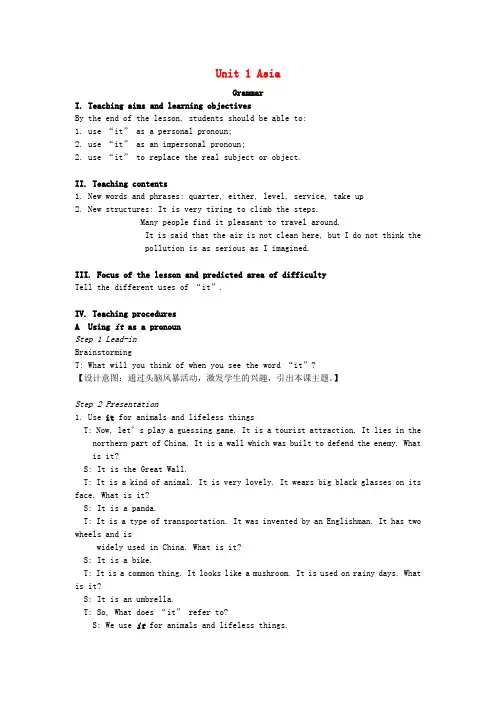
Unit 1 AsiaGrammarI. Teaching aims and learning objectivesBy the end of the lesson, students should be able to:1. use “it” as a personal pronoun;2. use “it” as an impersonal pronoun;2. use “it” to replace the real subject or object.II. Teaching contents1. New words and phrases: quarter, either, level, service, take up2. New structures: It is very tiring to climb the steps.Many people find it pleasant to travel around.It is said that the air is not clean here, but I do not think thepollution is as serious as I imagined.III. Focus of the lesson and predicted area of difficultyTell the different uses of “it”.IV. Teaching proceduresA Using it as a pronounStep 1 Lead-inBrainstormingT: What will you think of when you see the word “it”?【设计意图:通过头脑风暴活动,激发学生的兴趣,引出本课主题。
】Step 2 Presentation1. Use it for animals and lifeless thingsT: Now, let’s play a guessing game. It is a tourist attraction. It lies in the northern part of China. It is a wall which was built to defend the enemy. What is it?S: It is the Great Wall.T: It is a kind of animal. It is very lovely. It wears big black glasses on its face. What is it?S: It is a panda.T: It is a type of transportation. It was invented by an Englishman. It has two wheels and iswidely used in China. What is it?S: It is a bike.T: It is a common thing. It looks like a mushroom. It is used on rainy days. What is it?S: It is an umbrella.T: So, What does “it” refer to?S: We use it for animals and lifeless things.【设计意图:利用学生喜欢的猜谜游戏,激发他们的学习兴趣,在不知不觉中过渡至语法学习,将it指代动物或者无生命的事物的用法自然呈现。
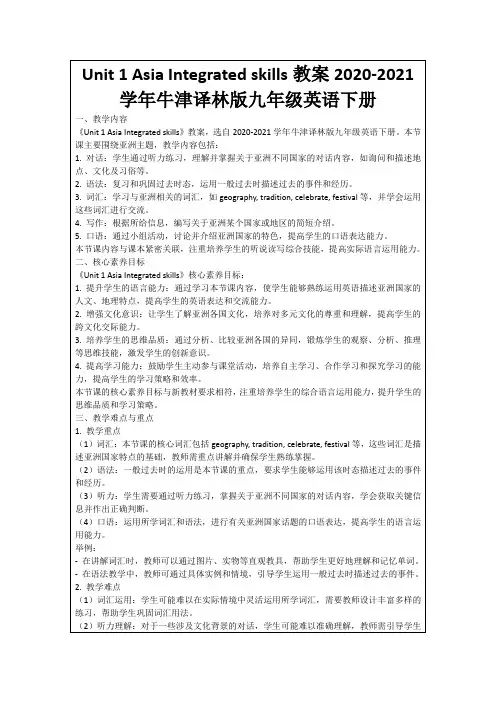
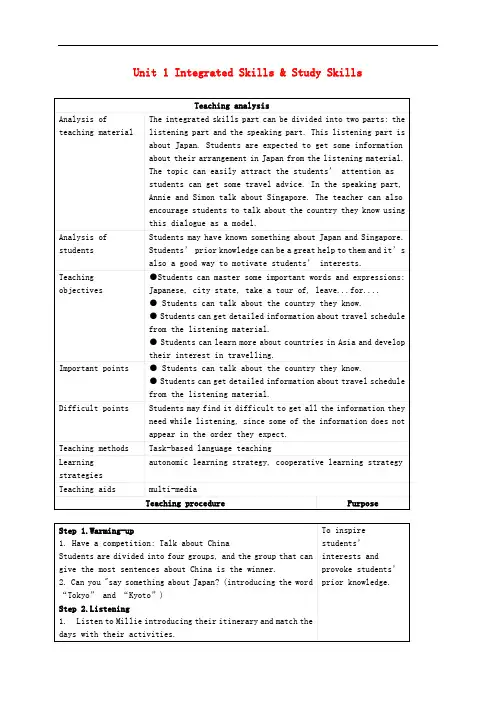
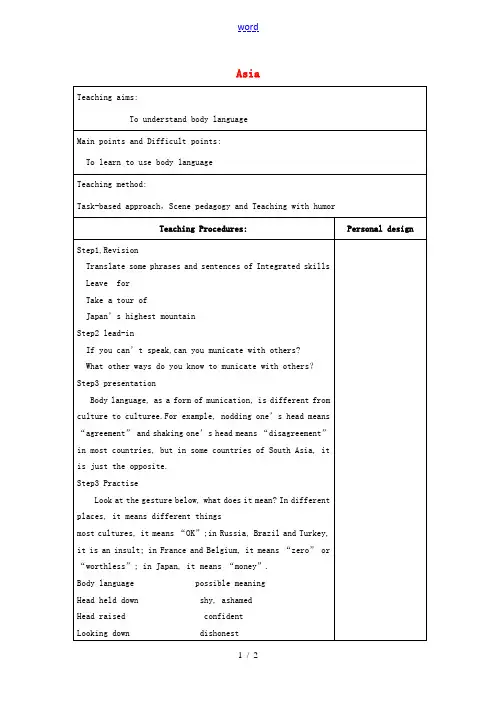
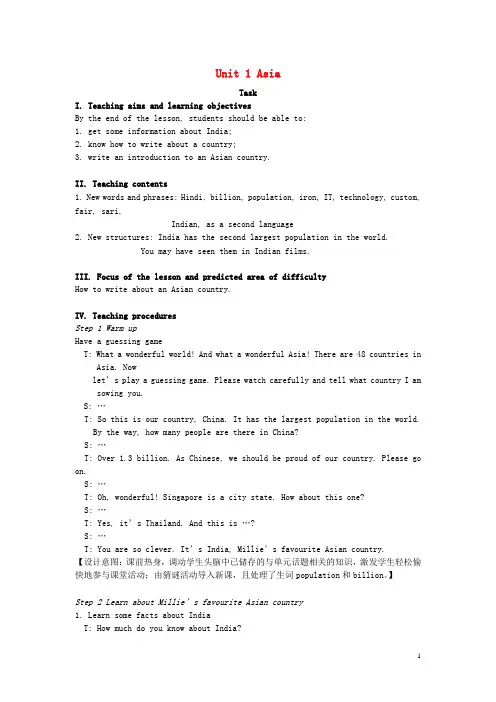
Unit 1 AsiaTaskI. Teaching aims and learning objectivesBy the end of the lesson, students should be able to:1. get some information about India;2. know how to write about a country;3. write an introduction to an Asian country.II. Teaching contents1. New words and phrases: Hindi, billion, population, iron, IT, technology, custom, fair, sari,Indian, as a second language2. New structures: India has the second largest population in the world.You may have seen them in Indian films.III. Focus of the lesson and predicted area of difficultyHow to write about an Asian country.IV. Teaching proceduresStep 1 Warm upHave a guessing gameT: What a wonderful world! And what a wonderful Asia! There are 48 countries in Asia. Nowlet’s play a guessing game. Please watch carefully and tell what country I am sowing you.S: …T: So this is our country, China. It has the largest population in the world.By the way, how many people are there in China?S: …T: Over 1.3 billion. As Chinese, we should be proud of our country. Please go on.S: …T: Oh, wonderful! Singapore is a city state. How about this one?S: …T: Yes, it’s Thailand. And this is …?S: …T: You are so clever. It’s India, Millie’s favourite Asian country.【设计意图:课前热身,调动学生头脑中已储存的与单元话题相关的知识,激发学生轻松愉快地参与课堂活动;由猜谜活动导入新课,且处理了生词population和billion。
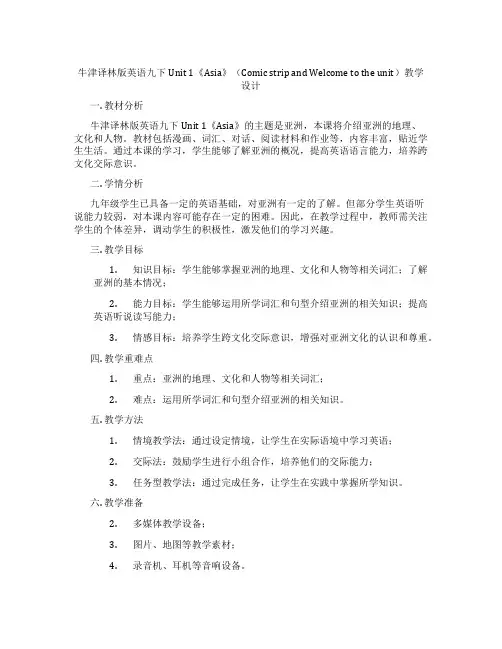
牛津译林版英语九下Unit 1《Asia》(Comic strip and Welcome to the unit)教学设计一. 教材分析牛津译林版英语九下Unit 1《Asia》的主题是亚洲,本课将介绍亚洲的地理、文化和人物。
教材包括漫画、词汇、对话、阅读材料和作业等,内容丰富,贴近学生生活。
通过本课的学习,学生能够了解亚洲的概况,提高英语语言能力,培养跨文化交际意识。
二. 学情分析九年级学生已具备一定的英语基础,对亚洲有一定的了解。
但部分学生英语听说能力较弱,对本课内容可能存在一定的困难。
因此,在教学过程中,教师需关注学生的个体差异,调动学生的积极性,激发他们的学习兴趣。
三. 教学目标1.知识目标:学生能够掌握亚洲的地理、文化和人物等相关词汇;了解亚洲的基本情况;2.能力目标:学生能够运用所学词汇和句型介绍亚洲的相关知识;提高英语听说读写能力;3.情感目标:培养学生跨文化交际意识,增强对亚洲文化的认识和尊重。
四. 教学重难点1.重点:亚洲的地理、文化和人物等相关词汇;2.难点:运用所学词汇和句型介绍亚洲的相关知识。
五. 教学方法1.情境教学法:通过设定情境,让学生在实际语境中学习英语;2.交际法:鼓励学生进行小组合作,培养他们的交际能力;3.任务型教学法:通过完成任务,让学生在实践中掌握所学知识。
六. 教学准备2.多媒体教学设备;3.图片、地图等教学素材;4.录音机、耳机等音响设备。
七. 教学过程1.导入(5分钟)利用图片、地图等教学素材,引导学生谈论亚洲的地理、文化和人物。
激发学生的学习兴趣,为接下来的教学活动做好铺垫。
2.呈现(10分钟)呈现漫画,让学生观察并回答以下问题:1.What are they talking about?2.Can you guess what they are going to do?3.What do you know about Asia?通过漫画引导学生进入学习情境,激发他们的学习兴趣。
牛津译林版英语九下Unit 1《Asia》(Task)教学设计一. 教材分析牛津译林版英语九下Unit 1《Asia》主要介绍了亚洲的自然地理、人文地理以及亚洲各国的主要城市。
本单元的话题贴近学生的生活实际,有利于激发学生的学习兴趣,提高他们的跨文化交际能力。
本节课的Task部分主要让学生运用所学知识介绍自己喜欢的城市,培养学生的写作能力和合作能力。
二. 学情分析学生在学习本单元前,已经掌握了有关地理、气候、城市等基本词汇和句型。
此外,他们对亚洲的一些国家和地区有一定的了解。
然而,学生在写作和口语表达方面还存在一定的困难,如语言能力、词汇搭配等。
因此,在教学过程中,教师需要关注学生的个体差异,充分调动学生的积极性和主动性。
三. 教学目标1.知识目标:学生能够掌握有关城市介绍的词汇和句型,如“The city isfamous for…”,“One of the most famous landmarks is…”等。
2.能力目标:学生能够运用所学知识介绍自己喜欢的城市,提高写作和口语表达能力。
3.情感目标:通过介绍自己喜欢的城市,培养学生对家乡和祖国的热爱之情。
四. 教学重难点1.重点:学生能够掌握有关城市介绍的词汇和句型。
2.难点:学生能够运用所学知识灵活介绍自己喜欢的城市,并在写作和口语表达中运用恰当的词汇和句型。
五. 教学方法1.任务型教学法:通过完成具体任务,让学生在实践中学习和运用语言。
2.合作学习法:学生分组进行讨论和写作,培养学生的团队合作能力和沟通能力。
3.情境教学法:创设真实的情境,让学生在实际语境中学习和运用语言。
六. 教学准备1.教师准备:提前准备相关城市的图片、视频等教学资源,以便在课堂上进行展示和讲解。
2.学生准备:学生提前了解自己喜欢的城市,准备相关素材。
七. 教学过程1.导入(5分钟)教师通过展示亚洲地图,引导学生回顾亚洲的国家和城市,为新课的学习营造轻松的氛围。
2.呈现(10分钟)教师展示自己喜欢的城市图片,并简要介绍该城市的特点,如“The city is famous for its beautiful scenery.”等。
Unit1 Reading15) Why was the Great Wall built in ancient times?6) Is Guilin in the north or south of China?7) Are there mountains and rivers in Guilin?8) How can you travel in Guilin?Step3 Further readingMatch the placesthe Palace Museum next to the Palace MuseumTian’anmen Square in the middle of Beijing the Summer Palace in the north of Beijingthe Great Wall in the north-west of BeijingRead it again and do some true or false questions1) Beijing is in southern China.2) Tian’anmen Square is close to the Forbidden City.3) The Great Wall is built around the Forbidden City.4) The Reed Flute Cave is in eastern Guilin.5) You can find man-made lakes inside the Reed Flute Cave.6) We can take a boat trip along Li RiverRead the two parts carefully to get some details.1) Match the name with the correct information.2) Ask some questions and get the students to answer.3) Fill in blanks according to the passage.Step4 Consolidation1. Do some exercises on the exercise book.2. Post-teachingDemands(要求):1) Group one asks questions about Beijing and group two answers them.2) Group two asks questions about Guilin and group one answers them. Rules:1) Time: only one minute.。
牛津译林版英语九下Unit 1《Asia》(Reading1)教学设计一. 教材分析牛津译林版英语九下Unit 1《Asia》(Reading 1)主要介绍了亚洲的一些国家及其特点。
本节课通过一篇阅读文章,使学生了解亚洲的地理、文化和历史背景,提高学生的阅读理解能力。
教材内容丰富,插图精美,激发学生学习兴趣。
本节课的教学内容适用于九年级学生,难度适中。
二. 学情分析九年级学生已经掌握了基本的英语语法和词汇,具备一定的阅读理解能力。
他们对亚洲国家有一定的了解,但可能对亚洲的地理、文化和历史背景知识不够深入。
学生在学习过程中需要通过阅读文章、讨论和实践活动来加深对亚洲的认识。
三. 教学目标1.知识目标:–掌握亚洲国家的地理、文化和历史背景。
–提高阅读理解能力,能够快速获取文章主旨和细节信息。
2.能力目标:–能够用英语描述亚洲国家的特点。
–能够与他人合作,进行讨论和交流。
3.情感目标:–培养对亚洲文化的兴趣和好奇心。
–增强学生的团队合作意识和跨文化交际能力。
四. 教学重难点•亚洲国家的地理、文化和历史背景。
•阅读理解能力的培养。
•文章中的一些特定词汇和表达方式的解释。
•对文章深层次含义的理解和讨论。
五. 教学方法1.任务型教学法:通过小组讨论、角色扮演等任务,激发学生的学习兴趣,提高学生的参与度。
2.互动式教学法:教师与学生之间的提问和回答,引导学生主动思考和探索。
3.情境教学法:通过图片、视频等直观手段,创设情境,帮助学生更好地理解文章内容。
六. 教学准备1.教学材料:教材、多媒体课件、图片、视频等。
2.教学设备:投影仪、计算机、音响等。
3.教学资源:互联网上的相关资料。
七. 教学过程1.导入(5分钟)利用图片和视频展示亚洲的美丽景色和特色文化,引导学生对亚洲产生兴趣。
教师提问:“你们对亚洲有哪些了解?”学生回答后,教师总结并引入本节课的主题。
2.呈现(10分钟)教师引导学生阅读文章,让学生通过自主学习获取文章主旨和细节信息。
Unit 1 Asia
Period 1 Comic strip and Welcome to the unit
Teaching aims
Make the students learn more interesting places in Chin a.
Talk about different countries in Asia.
Learn some Chinese things.
Teaching focus
Help the students learn to introduce some famous things in Beijing in En glish. Difficult points
Talk about different countries in Asia.
Step1 Lead-in
Talking about the places of interest in Beijing.
1. Show some pictures to the students. Get them to guess what it is.
2. Encourage the students to describe them.
Step2 Listen and read
Tell the students that Eddie and Hobo are visiting the Great Wall.
a. Get the students to listen to the tape and find out what happened.
1)What happened to Hobo’s feet?
2)What was he doing then?
3)What did Hobo advise Eddie to do?
4)What was Eddie’s decision?
. Get the students to read and practice the dialogue and then act the dialogue out. Step3 Presentation
Get to know the countries in Asia.
1. Say “what country is east to China”.
Show some pictures about the country. (Japan)
2. Say “what country is northeast to China”.
Ask:How does Mille learn about the world?why?
How does Simon learn about the wwrld? Why?
Work in pairs to practice the dialogue.
Sample conversation :
S1:How do you learn about the world?
Show some pictures about the country. (Korea)
3. Say “what country is north to China”.
Show some pictures about the country. (Mongolia)
4. Say “what country is southwest to China”.
Show some pictures about the country. (India)
Encourage the students to say something about these countries.
Step4 Showing and discussion
Get to know Chinese things.
1. Show the pictures about Chinese things such as: dragon dance, Chinese opera, chopsticks, Chinese knot, Chinese paper cut and Chinese kung fu.
2. Encourage the students t o talk about the pictures.
3. Encourage the students to say m ore about Chinese things.
4. Get the students to talk about some famous Chinese things.
Step 5 Practice
Finish the exercises in Part A.
Talk about the places of interest in China.
Step 6 Consolidation
Write a short passage to describe one of the famous places in China and choose a piece o f writing to read in cla s s.
Step5:Homework。